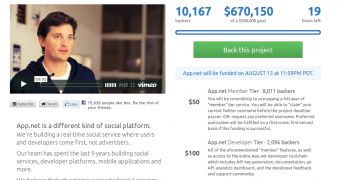The much-talked about, well, in some circles, App.net has been funded. The site was asking for $500,000 in funding, from its would-be users, in order to get the ball rolling. Within a day of the deadline, it reached its goal and now has over $670,000 from early adopters.
There's already an alpha version of the site and platform. There's also some time left to join the new site, provided you have the pockets to do so.
So what is App.net? In essence, it's a Twitter competitor, a Twitter clone to be exact. The twist is that it's a paid product, while Twitter is free. It's also just starting up, at the moment it has a little over 10,000 users.
The fact that you have to pay for it, the fact that Twitter already exists and the fact that Twitter has tens of millions of active users would suggest that App.net is a dead end.
But for the site and its backers, all of those things are actually good points. A yearly fee means that the site can stay free of advertising.
This means that the developers can focus on making the site great for users instead of lucrative for advertisers. There's a lot to be said about that in an increasingly closed and page-view driven and web.
What's more, the fact that there are so few users means that the discussion is of a higher quality than on Twitter, especially when you take into account the fact that people pay to get in. At least, that's the hope.
What's more, it means that it's actually possible to follow the global discussion and actually get to know many of the users.
App.net is the brainchild of developer Dalton Caldwell, of imeem fame, who was fed up with Twitter's increasingly hostile attitude against external developers using its APIs. That attitude is the result of Twitter wanting to bulk up its ad revenue.
There are things to like about App.net. And there are ways through which it will scale, to a degree, and generate enough revenue to keep it in business and be profitable.
But its success depends on how you measure that success. If the goal is to create a small community of experts and generate enough revenue to sustain itself, then App.net can already be considered a success. If the goal is to take on Twitter then, well, App.net has a long way to go before being considered a success. In all likelihood, it's never going to get there.
There is no way App.net can convince hundreds of thousands of users, let alone tens of millions, to pay for something they can get for free. What's more, for something they don't really know they want.
Twitter's biggest problem is that non-users don't know what they'd do with it. Even if it convinces people to sign up, most give up shortly after since they don't "get" Twitter and don't know what to do with it. Twitter has a problem with growth even as it has tens of millions of active users, hundreds of millions of users in total, and huge media coverage.
App.net doesn't seem to bring that much more to the table for it to not only succeed where Twitter has failed so far, but to do it while charging people money for it.
Oh, and the much-talked about platform, the big reason why App.net was created in the first place, the hint is in the name, doesn't stand a chance with 10,000 users or even with 100,000 or even with one million. Microsoft is having problems attracting developers to Windows Phone, even Android still lacks in developers.

 14 DAY TRIAL //
14 DAY TRIAL //